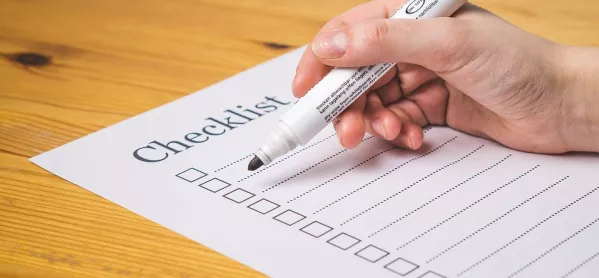School closures: A checklist for leaders on what to do

When we were plunged into Lockdown version 1.0 back in March last year, it was a scramble to try and work out everything that we might need to do in order to deliver a full educational package without being in school.
Now, seasoned experts in all things remote, we enter Lockdown 3.0 without that same sense of panic, but with a far greater understanding of the complexities of remote working and the challenges of lockdown living, and with an experienced and cynical eye on the news feeds.
With that in mind, here’s a revised list of things to consider on how to manage another period of remote teaching with only a limited number of staff and students in school.
Coronavirus school closures: A leader’s to-do list
Staffing
- Ask staff to update their personal details and contact numbers - it may have been a while since you last did this.
- Remind staff about how to report an absence and signpost the process for self-isolation and Covid testing.
- Re-circulate details of staff wellbeing and support services, or update them if you have changed or added providers.
- Find out from staff what they really valued from the first lockdown - ie, regular staff updates, virtual staffrooms, weekly comms - and put that in place again
- Consider what lessons you learned from remote working before. What were your main stumbling blocks? Which members of staff experienced unforeseen issues or difficult times? Check up on them now to see how they’re doing, and be ready to support them directly if required.
- Be aware of lockdown fatigue. Many of us have lost heart at times and struggled to focus on work. Be aware, talk about wellbeing and give clear messages that it is OK to feel like that sometimes. Tell your own stories and keep mental health as a top priority.
Premises
- Check with your site staff to ensure that heating systems and timers have been adjusted for a much lower occupancy. If you can, keep on-site staff in one area of the school and shut down heating systems in unused areas. There’s no point wasting a fortune heating an empty school.
- Suspend your waste collections and postal deliveries, taking into account whatever your core hours will be.
- Review your statutory regimes (legionella testing, fire safety checks, fire evacuation policy, etc) to ensure that they are suitable for your new way of working.
- Ask someone to do the fridge, lockers and food store checks. Catering teams were expecting to feed a full school before Christmas, so may well have placed large food orders for delivery this week.
Administration and Finance
- Check with your finance teams to see if any orders placed recently are no longer required. Cancel what you can and return goods where possible.
- Start thinking about next year’s budget now. Finance teams will already be on the case, but ensure that year end doesn’t creep up on you unannounced.
- Check any contracts due to expire in the next few weeks and make sure nothing vital is going to be switched off that you might now need to keep going.
Stay in the loop
- Make sure someone is monitoring the main school email account that receives Department for Education update emails. They are coming thick and fast at the moment, as experience tells us that updates are inevitable and frequent.
- Keep an eye on social media, where most of the leading stories seem to break first. Follow @tes, obviously, and think about setting notifications for tweets from the accounts you find the most useful.
- Share information and ideas about what you’re doing with others, too. During the last lockdown, we all invented many of the same wheels, but some leaders shone out by offering their expertise to others. Be a giver, too.
- One thing we have definitely learned from previous lockdowns is that schools are experts in innovation, so keep networking and actively seek ideas from colleagues about new ideas and things to try.
- Keep your governors informed and up to date with what’s going on. It’s easy to forget how fast our contexts are changing. Ensure that you’re still compliant by getting the sign-offs and agreements you need rubber-stamped. The usual legal frameworks we operate in are ever-changing. Cover your back.
And finally, look after yourself. These past few months have been the most stressful many of us have ever encountered, and we know that there is more to come.
Acknowledge that you haven’t been able to rest over Christmas, accept that you aren’t immortal, and take time to rest, sleep and heal whenever you can. Treat yourself as the most expensive asset the school has, because you probably are.
Stay safe everyone.
Hilary Goldsmith is a school business manager in the South of England
With many thanks to Helen Burge, who tweets @DeputyCOOatTPLT, for her contributions to this article
Register with Tes and you can read two free articles every month plus you'll have access to our range of award-winning newsletters.
Keep reading with our special offer!
You’ve reached your limit of free articles this month.
- Unlimited access to all Tes magazine content
- Save your favourite articles and gift them to your colleagues
- Exclusive subscriber-only stories
- Over 200,000 archived articles
- Unlimited access to all Tes magazine content
- Save your favourite articles and gift them to your colleagues
- Exclusive subscriber-only stories
- Over 200,000 archived articles
